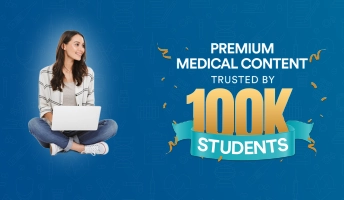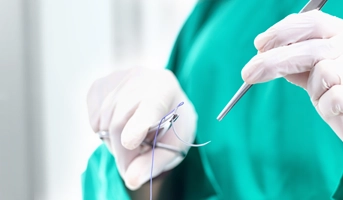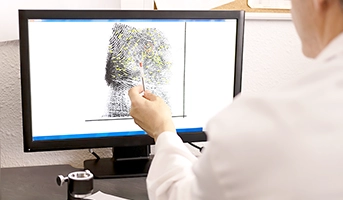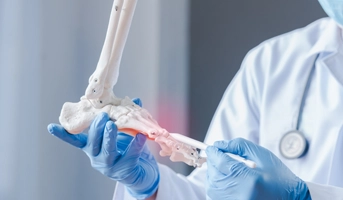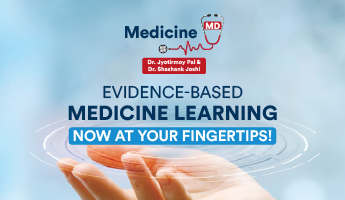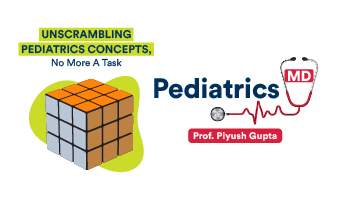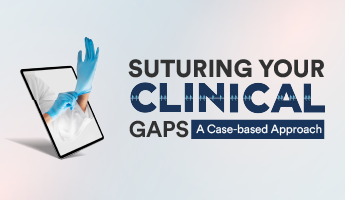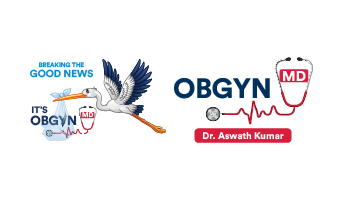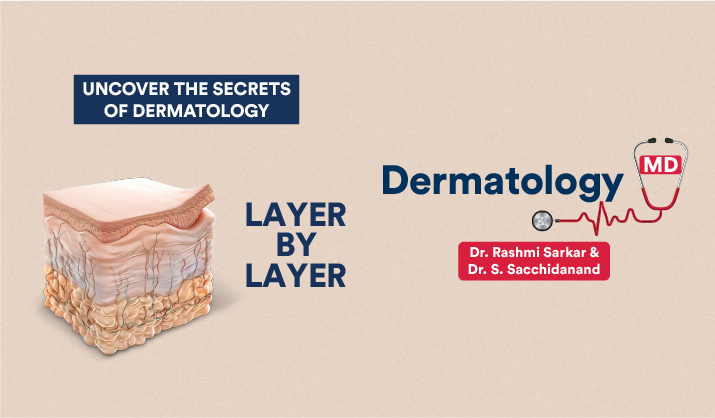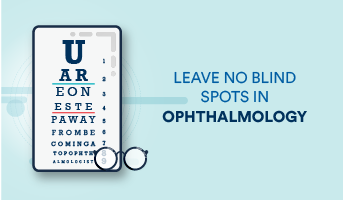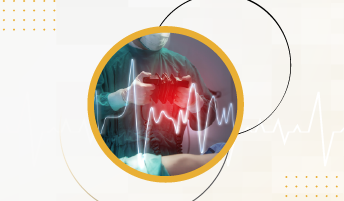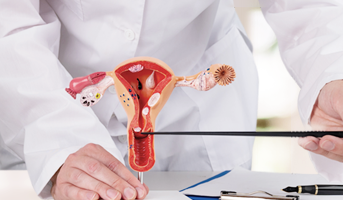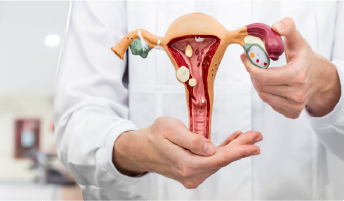Ophthalmology is a branch of medicine dealing with the diagnosis and treatment of disorders and diseases of the eye. The subject includes surgical procedures and medical treatment. Ophthalmology for UnderGrads might not be as vast as medicine or surgery subjects, but it holds great significance and hence, a medico must have a strong foundation in the subject. Medical students must be well-versed in the anatomy and physiology of the eye along with the diseases.
High-yielding topics are a crucial component of an efficient study plan that will help you perform well on tests. A medico must strategically arrange their preparation, emphasizing time management, high-yielding topics from each subject, and, most importantly, their health.
MBBS Prof Exam Pattern
According to the new CBME curriculum, the ophthalmology prof exam comprises 100 marks theory exam and 100 marks practical/oral examination. The types of questions asked in the theoretical test include structured essays (long answer questions), short response questions, and objective questions (MCQs and IBQs).
Important topics of Ophthalmology for MBBS Prof Exams, NEET-PG and INI-CET
If you want to pursue higher education, you should concentrate on early preparation for both regular examinations and competitive tests during MBBS. Currently, India has two major exams: one is NEET PG/NExT Exam and the other is INI-CET Exam. The weightage of Ophthalmology is around 6-8 questions in INI-CET and 10 questions in NEET PG.
Here’s a list of important topics of Ophthalmology for MBBS prof exams, NEET-PG, and INI-CET entrance examinations.
- Lens: Anatomy and Physiology of lens
- Cataract: Define, Etiology, Management
- Cataract Surgeries, their procedure, and complications
- ECCE
- Phacoemulsification and SICS
- ICCE
- ICCE vs ECCE
- Types of Cataracts:
- Developmental/Congenital
- Senile Cataract
- Coronary
- Traumatic
- Hypermature
- Complicated
- Hypopyon corneal ulcer
- Mycotic corneal ulcer
- Corneal ulcer
- Corneal opacities
- Congenital abnormalities of the Cornea
- Cornea degeneration
- Vision Assessment
- Strabismus to Amblyopia
- Chalazion
- Orbital Cellulitis
- Cavernous Sinus Thrombosis
- Hypermetropia
- Myopia
- Scleritis and Episcleritis
- Hypertensive & Diabetic Retinopathy
- Red eye
- Anterior uveitis
- Festooned pupil
- Hyphema – Causes, C/F, Rx
- Glaucoma:
- Define and classification
- Glaucoma- POAG, PACG
- Open-angle glaucoma- define, C/F, Rx, Field changes
- Angle-closure glaucoma- define, etiopathogenesis, C/F, Rx
- Anti-glaucoma drugs
- Drugs:
- Pilocarpine
- Timolol
- Atropine
- Acyclovir
- Cyclopentolate
- Vitamin A
- Vision 2020
- Causes- Sudden loss of vision
- Retina: CRVO, CRAO, CME, CSR
- Retinoscopy
- Retinal detachment
- Proliferative diabetic retinopathy
- Ophthalmoscope
- Dry eye
- Penetrating keratoplasty
- Keratitis
- Bacterial conjunctivitis
- Allergic conjunctivitis-full
- Xerophthalmia
- Phlyctenular Keratoconjunctivitis
- Pterygium – detection, types, C/F, Management
- Trachoma
- Anterior uveitis
- Epiphora
- Chronic dacryocystitis
- Acute dacryocystitis
- Congenital dacryocystitis
- Optics
- Types of refractive errors
- Neuro-Ophthalmology
- Toxic Amblyopia
- Optic neuritis
- Squint: Paralytic squint, Concomitant squint
- White pupillary reflex
- Blowout fracture of the orbit
- Thyroid eye disease
- Blunt injury of the eye – Ocular trauma, classification, and management
- NBCP
All the aforementioned are NEET PG 2023 high-yield topics and are regularly asked in MBBS professional exams. Avoid skipping these crucial topics if you want to perform well in your tests.
Ophthalmology for UnderGrads is one of the best online ophthalmology courses to supplement your studies and NEET PG preparation. The course is designed according to the CBME curriculum and is taught by renowned professors, Dr. Parul Ichhpujani and Dr. Talvir Sidhu. This online course offers highly illustrative video lectures, case studies, notes, clinical cases and 1000+ self-assessment questions. The video lectures are profusely illustrated with clinical and radiological images along with tables and flowcharts. The lectures use the revolutionary CBME methodology, which guarantees intellectual clarity and excellent results in the prof exams and entrance exams. The course covers a detailed explanation of the disease pathogenesis and ocular examination.
Check out 2 Months strategy to crack NEET PG 2023: https://www.diginerve.com/tips-on-how-to-crack-neet-pg-in-2-months/
Click here to know the important topics of Microbiology for NEET-PG.
Click here to know the important topics of Community Medicine for NEET-PG.
Click here to know the important topics of Pharmacology for NEET-PG.
Frequently Asked Questions (FAQs)
Q 1. How to learn Ophthalmology for MBBS online?
Ans. Ophthalmology for Undergrads, taught by famous professors Dr. Parul Ichhpujani and Dr. Talvir Sidhu, is one of the best online ophthalmology courses to supplement your studies and NEET PG preparation. The highly illustrative video lectures, case studies, notes, and self-assessment questions are included in this online course. The unique CBME methodology used in the course ensures intellectual clarity and superior performance in the prof examination as well as entrance examinations.
Q2. Which is the recommended book for Ophthalmology for MBBS students?
Ans. Clinical Cases in Glaucoma: An Evidence-Based Approach by Parul Ichhpujani & Shibal Bhartiya, Expert Techniques in Ophthalmic Surgery by Parul Ichhpujani, George L. Spaeth & Myron Yanoff and Gonioscopy: A Video-Assisted Skill Transfer Approach by Talvir Sidhu, Tanuj Dada, Amit Kumar & Ajay Sharma are some of the recommended books for Ophthalmology.
Q3. Is Ophthalmology important for NEET PG?
Ans. Yes, Ophthalmology is a scoring subject and has a weightage of around 10 questions in NEET PG Exam 2023.
Q4. What are the important topics of ophthalmology?
Ans. The important topics of Ophthalmology include the Anatomy and Physiology of lens, Cataract Surgeries, Retinoscopy, Retinal detachment, Proliferative diabetic retinopathy, Ophthalmoscope, Red eye, Penetrating keratoplasty, Uveitis, Cornea degeneration, Vision Assessment, Strabismus to Amblyopia, Chalazion, Orbital Cellulitis, Cavernous Sinus Thrombosis, Hypermetropia, White pupillary reflex, Blowout fracture of the orbit, Thyroid eye disease, and more.
Ophthalmology is a branch of medicine that deals with the diagnosis and treatment of the eye and associated adnexa. Studying Ophthalmology in MBBS has now diversified with multiple subspecialties like cornea, ocular oncology, pediatric ophthalmology, glaucoma, neuro-ophthalmology, and ocular pathology.
Most students get confused as to which topics to read first and emphasize more upon, how to plan the study, what practical aspects/skills are to be known and mastered, etc. If this is the case with you, the below tips to study Ophthalmology in MBBS will surely be your saviour:
Study from Trusted Content: The revised curriculum of Ophthalmology emphasizes core competencies and defines the domain of learning as well as the level to which a concept needs to be studied. Therefore, students must focus on finding the most updated and reliable content as per the latest advancements in the curriculum.
Watch Clinical Case Discussions: DigiNerve’s online Ophthalmology course is best for conceptual clarity through clinical case discussions. This course has been conceptualized and developed as per the new CBME curriculum. It includes a demonstration of basic history-taking and clinical examination of the eye in an elaborate lecture to acquaint the students with a comprehensive overview.
Practise questions from exam POV: Practise as many questions as possible to get maximum exposure for your exams. Seek content that prepares you for university exams as well as PG entrance examinations.
Learn from Top Faculty: Find study material by experts who cover the art of studying ophthalmology along with theory, practical, and NEET PG examinations. It’s best if the faculty give you a road map to approach the subject.
Study Ocular Examination in detail: Focus on anatomy and physiology in each topic and cover the pathogenesis of various diseases with a detailed explanation on how each condition will appear on the ocular examination. Find clinical, radiological images along with flowcharts, tables, and boxes, wherever necessary to memorize better.
To watch Ophthalmology lectures for MBBS online, check out DigiNerve.
FAQs:
How can I study ophthalmology fast?
Refer to popular books and watch video lectures by trusted faculty. Images, flashcards, and flowcharts will help you remember what you’re learning.
Why is ophthalmology so competitive?
It’s not completely true, Ophthalmology is misunderstood to be far more competitive than it is. Conceptual clarity can make it easy to understand and clear exams.
How do I become an Ophthalmologist after MBBS?
One should complete his/her MBBS degree and then pursue post-graduation in Ophthalmology to become a qualified Ophthalmologist.
What does an Ophthalmologist do?
An ophthalmologist specializes in the treatment of illnesses, injuries, diseases, and conditions related to the eye.

